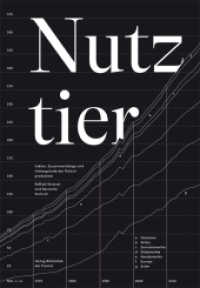Full Description
Providing a cornerstone to the global debate on equity and inclusion within education, this handbook explores equity issues pertaining to poverty and social class, race, ethnicity, sociocultural, sociolinguistic exclusion in education and recognises intersectionality and gender across these dimensions.
This carefully curated collection of essays written by international experts promotes inclusive systems in education that explicitly recognise the voices of learners who may be at risk of marginalisation, exclusion or underachievement. Developing a multilayered innovative conceptual framework involving spatial, emotional-relational and dialogical 'turns' for education, it emphasises key system points for reform, including building strategic bridges between health and education for vulnerable groups and shifts in focus for initial teacher education and the wider curriculum.
The handbook is organised into the following key parts:
Theoretical Frameworks
Funding Models and Structures for Equity and Inclusive Systems
Exclusion and Discrimination
Bridging Health and Education
Agency and Empowerment
Outreach and Engagement
The Routledge International Handbook of Equity and Inclusion in Education will be of great value to academics operating in the areas of education, psychology, sociology, social policy, ethnography, cultural studies; researchers in university research centres and in policy institutes pertaining to education, poverty, social inclusion as well as international organisations involved with inclusion in education.
Contents
1. Editors' Introduction: Multi-layered Equitable Inclusive Systems: The Emergence and Expansion of a Global Framework to Eliminate Socioeconomic and Sociocultural Exclusion in Education
SECTION I: Theoretical Frameworks
2. Framing and Practicing Equity, Diversity, Inclusion, and Decolonization (EDID) in Inclusive Education Systems: Progress, Tensions, and Ways Forward
3. Uncovering the Axis of Tension between Diametric Oppositional Space of Othering and Connective Concentric Space of Inclusion: Moving beyond Western Ethnocentric Space
4. Towards a Border Transgressing Pedagogy: Disrupting Oppressive Ecologies of Control, Surveillance, and Displacement in Schools and Beyond
5. When Inclusion Means Exclusion and The Terms of Belonging are Obfuscated: What's the Role of Race?
6. Dynamics of inequalities in higher education: A multidimensional and comparative social justice perspective
SECTION II: Funding Models and Structures for Equity and Inclusive Systems
7. The effectiveness of equity funding of schools: a comparative analysis of Flanders, The Netherlands, France, Ireland and England
8. The Elusive Quest for Equity and the Need for Remedies Beyond Improved Schooling
9. The costs of failing to be inclusive: An analysis based on education in Australia
10. Inclusive educational systems around the globe: Evidence from international comparative large-scale student assessments
11. Funding and equity in education: The role of system structures
12. Equity and inclusivity in school funding: case study of an Australian State
SECTION III: Exclusion and Discrimination
13. School as the Agency of Social Reproduction: A Case of Medium of Instruction Policymaking for Quasi-privatization in Nepal
14. A Structural Scrutiny of School Exclusion in Sweden and Lithuania: An Interdisciplinary Rights-Based Analysis
15. Understanding gender gaps in education: The role of stereotypes and the intersection with social class
16. The monolingual habitus of the multilingual school as a barrier to educational equity
17. Reality and Challenge in Ensuring Educational Rights for Children with Disabilities in Ethnic Minority Areas of China
18. Caste Discrimination in Education: A study of the Dalit Minority in Odisha, India
SECTION IV: Bridging Health, Wellbeing and Education
19. Hunger in the UK Classroom
20. Students' Voices: A participatory approach to Social and Emotional Education
21. Guaranteeing Inclusive Education under International Human Rights Law: A Proposal for the Use of Structural Indicators Addressing Issues of Equality, Non-discrimination and Wellbeing
22. School-Based Community Work Through a University-Community Partnership Using a Participatory Approach: The SOYAÇ Model
23. Promoting equity through Comprehensive Community Initiatives in England
SECTION V: Agency and Empowerment
24. Promoting Educational Equity for Migrant Children in China
25. Indigenous Principles Guiding Inclusive Structures and Practices in Teacher Preparation: Aboriginal Teacher Education Program in Alberta, Canada
26. Walking Alongside: A Relational Conceptualization of Indigenous Parent Knowledge
27. Australian school students, teachers and AIME's understanding of respect: 'talking about the same thing but not speaking the same Language'
28. Improving the Literacy Outcomes of Socioeconomically Excluded Students: How Research Can Inform Policy
SECTION VI: Outreach and Engagement
29. Priming the mesosystem: Fostering home-school connections in different contexts and from differing perspectives
30. Grassroots Roma women and their role in promoting equity in education for all Roma
31. Exploring Immigrant Women's Learning Experience in Multicultural Societies: A Summative Content Analysis
32. Optimizing Educational Models and Services for K-12 Newcomer Youths and their Families:A Qualitative Investigation within a Localized Context
33. Editors' Conclusion: Key Emerging Conceptual Movements to Underpin the Multilayered Framework of Equitable Inclusive Systems in Education





